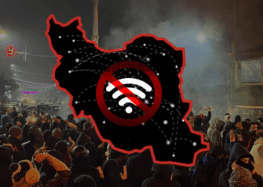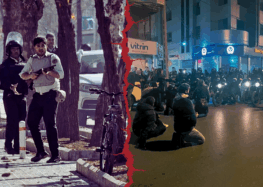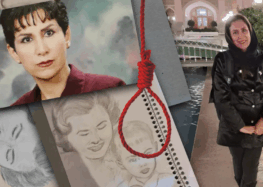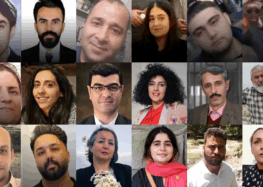‘They see us as targets’: Iran’s Brutal Repression of Journalistic Freedom
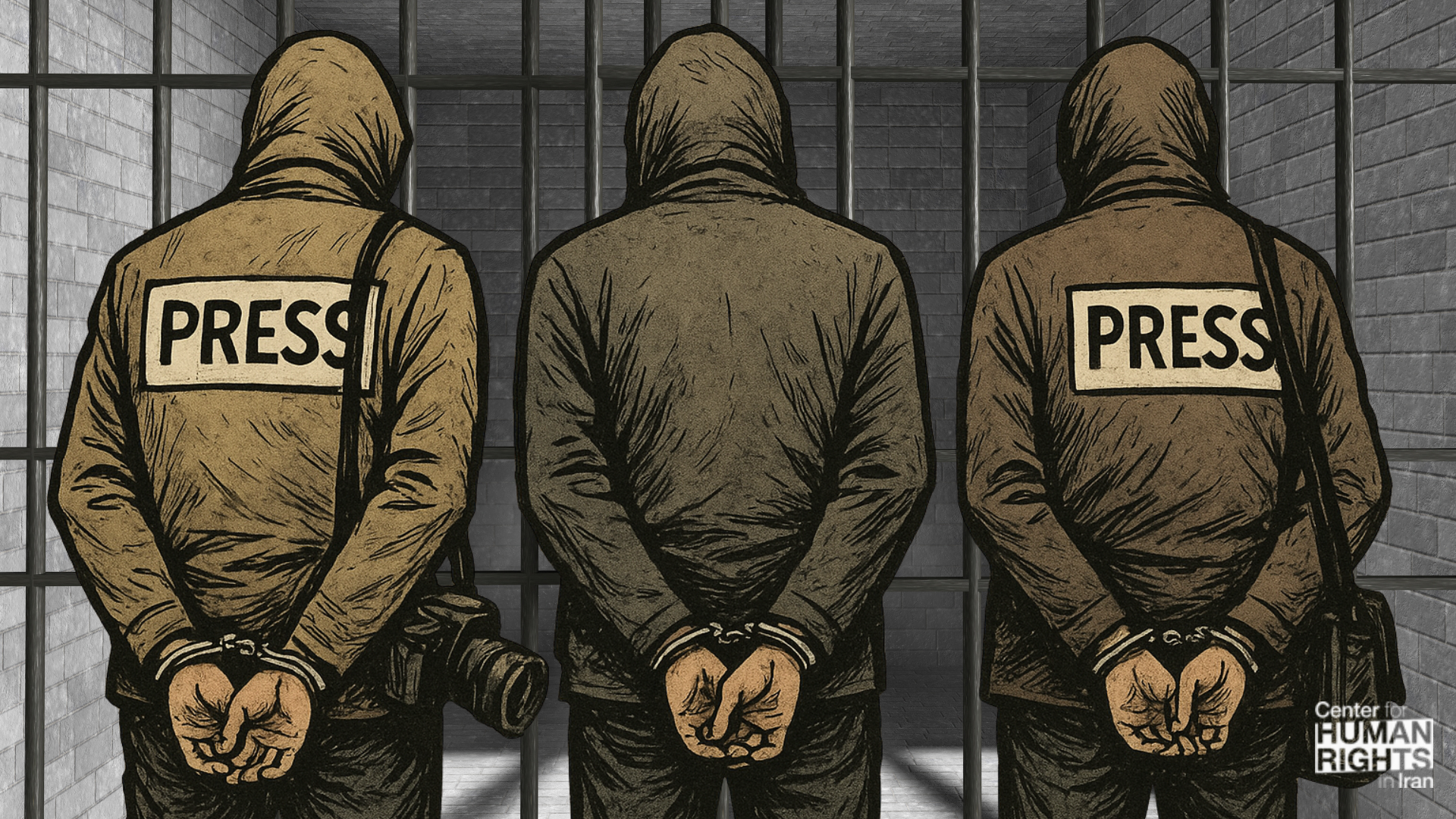
‘Don’t step outside your house. You are going to be arrested again.’
September 3, 2025 — The Islamic Republic of Iran continues to be one of the most dangerous places in the world for independent journalists to work. Journalists who stray from the official state line in their reporting are subjected to threats, surveillance, office closures, arbitrary arrests, and legal prosecution.
CHRI has compiled a comprehensive list of arrests, summonses, and judicial actions taken against journalists so far this year, presented below. In addition, CHRI conducted an in-depth interview with a female journalist in Iran, discussing the current conditions faced by media workers in the country. The full interview can be read below.
“Locking up independent journalists is a critical part of the Islamic Republic’s strategy to silence dissent and hold onto power,” said Hadi Ghaemi, executive director of the Center for Human Rights in Iran (CHRI). “The international community should speak out for the individuals in Iran sacrificing their livelihoods and often their freedom to speak truth to power.”
CHRI calls on international journalists and rights organizations, the UN, and governments worldwide to demand the freedom of imprisoned journalists in Iran and respect for the right to freedom of the press.
According to Reporters without Borders, at least 21 journalists are currently detained in Iran, ranking Iran 176th in press freedoms out of 180 countries—one of the worst in the world.
While Article 24 of Iran’s constitution guarantees press freedom, the country’s press laws codify the state’s ability to repress, allowing prosecution for charges such as “spreading false information,” “insulting the Supreme Leader,” “propaganda against the state,” or “endangering the Islamic Republic.”
Harassment, Arrests, and Judicial Pressure
Since the start of 2025, multiple journalists and media workers have faced intimidation and legal action. For example:
- Saeideh Shafiei, journalist and former political prisoner, had her SIM card blocked by security agencies, forcing her to deactivate her social media accounts and sign a pledge requiring her to publish 20 pro-government social media posts, her husband Hassan Homayoun announced on July 31, 2025. “The charges against her are based on tweets and posts for which she had previously been imprisoned,” he added. Shafiei was previously sentenced to four years and three months in prison for “propaganda activities against the system” and “gathering and collusion against national security.” She was released in February 2025.
- Soltanali and Farshid Abedi, two journalists from Sistan and Baluchistan, were summoned to the Public and Revolutionary Zahedan Prosecutor’s Office on charges of “spreading falsehoods” following a complaint filed by the Southeast Railway Company on August 8, 2025. The current status of this ongoing legal case is unknown.
- Mansour Iranpour, a media activist based in Kerman, was summoned in early August 2025 by Branch 3 of the city’s Revolutionary Prosecutor’s Office on charges of “spreading falsehoods” for a critical post about the governor of Kerman on social media. The current status of this ongoing legal case is unknown.
- Omid Faraghat, a journalist and political media activist, was sentenced to three months in prison by Branch 26 of the Tehran Revolutionary Court for alleged “propaganda against the regime” following a hearing held on July 13, 2025, while Branch 3 of the Karaj Revolutionary Court acquitted him of other charges.
- Meysam Rashidi was arrested on August 5, 2025 in Ardabil following a complaint from the city’s mayor and the issuance of a temporary detention order after Rashidi published critical content on social media about the municipality’s performance. He was temporarily released on bail pending trial. Earlier this year in March, Rashidi was reportedly assaulted by Ardabil municipality’s security personnel after he criticized the Municipality football team’s management.
- Iraj Pashapour, an Azerbaijani-Turk journalist and media activist, was sentenced to nine months in prison and banned him from using social media for one year for charges of “propaganda against the Islamic Republic” by Branch 1 of the Revolutionary Court on August 10, 2025.
- Azhdar Piri, a Kurdish researcher and editor-in-chief of the Research of Nations magazine, was arrested on May 4, 2025, after reporting to the Sentence Enforcement Branch of Karaj Prosecutor’s Office and transferred to the Central Prison of Karaj to serve a one-year prison sentence. He was sentenced in January 2025 by Branch 3 of the Revolutionary Court in Karaj to one year in prison and a two-year ban on online activities for “propaganda against the state.”
- Mohammad Parsi, editor-in-chief of Kandoo magazine, was summoned in April 2025 by Branch 9 of the Culture and Media Prosecutor’s Office over a new case linked to his online posts. Security forces searched his home and seized devices. Parsi has previously faced multiple charges, including “propaganda against the regime” and “spreading falsehoods,” as well as fines and cases over his reporting on Nika Shakarami’s death and the 2024 presidential election.
- Mandana Sadeghi, Kourosh Karam-Pour, and Farzaneh Yahya-Abadi were sentenced by Branch One of the Abadan Revolutionary Court to prison terms in March 2025. Sadeghi was convicted of “propaganda against the regime” and sentenced to 7 months and 16 days in prison and “assembly and collusion against national security” and sentenced to 3 years, 6 months, and 1 day in prison. Karam-Pour was sentenced to 2 years on similar charges, and Yahya-Abadi received 3 months and 1 day in absentia for “propaganda against the regime.”
Detaining “Citizen Journalists” Over Ties to Persian-Language Media Abroad
In addition, Iran’s Ministry of Intelligence summoned or detained 98 citizens for alleged links to a Persian-language media outlet outside the country during the June 13 to 24 Iran-Israel war, state-owned Mehr News Agency reported on July 28.
The detainees were described as “citizen-journalists” allegedly connected to an “affiliated operational network” inside Iran. The ministry did not provide evidence for its allegations and did not disclose the names, locations, or legal status of those detained or summoned.
Press photographers: “We were hunted”
Press photographers have also been harassed and detained. The head of Iran’s Press Photographers’ Association, Hamid Forootan, reported that photojournalists covering the aftermath of Israeli airstrikes on state broadcaster IRIB were detained by the authorities for up to 48 hours and denied permission to work.
Photographer Majid Saeedi wrote that security forces treated journalists as targets during the war:
“They didn’t see us as heroes, but as ‘targets.’ We were hunted, and some, like me, were literally hunted. I still remember. In the final days of that conflict, after being arrested and released without explanation, suddenly the phone rang. From the very place that had once issued my journalist card. They said: ‘Don’t step outside your house. You are going to be arrested again.’ Cold, without explanation.”
Tehran Journalists’ Association’s Office Shut Down
On August 19, 2025, the Tehran Journalists’ Trade Association announced that its office was closed, adding that the recent eviction was not about a building but about journalists’ professional freedom. Akbar Montajabi, the association’s chair, said the move is politically motivated, resulting in “weakening independent journalism and promoting managed journalism.”
In a statement the Association said:
“The forced eviction of the Tehran Journalists’ Trade Association office is not merely a dispute over a building; it is a blatant assault on professional independence, the freedom of journalistic activity, and the pluralism of society. …Should the forced eviction of organizations such as the House of Humanities Thinkers, the Iranian Sociological Association, and now the Tehran Journalists’ Trade Association be considered an isolated incident, or is it part of a continuing trend that could soon affect other independent institutions and associations?”
Interview with a Journalist in a Northeastern Iranian City
“The media mafia, deeply tied to the state apparatus, simply does not allow those who stand against the government to continue their professional activity.”
In an extended interview CHRI conducted in August 2025, a journalist based in a northeastern Iranian city talked at length about the severe restrictions and pressures faced by media workers in the country, where journalists must choose between toeing the state line or risking arrest and prison. Extensive excerpts from the interview follow.
“The process for obtaining a license for television and radio media in Iran works as follows: you must first submit your application to the Ministry of Culture and Islamic Guidance. After review and approval by the ministry, and passing their filtering and evaluation procedures, you must also obtain approval from IRIB [Islamic Republic of Iran Broadcasting, the state broadcaster] in order to launch your own radio or television station.
“Usually, this system is entirely controlled by the government, and private individuals rarely pursue it. Even the provincial and local networks we see operate under the supervision of IRIB, whether in Tehran or other Islamic broadcasting centers. Practically speaking, there is no private or independent radio or television in Iran.
“In the online domain …I have not seen anyone establish a fully independent news agency, though smaller personal news websites exist—they are much smaller, more limited, and their activities are heavily restricted. The licensing process for these online media is similar to that of traditional media: you must submit your application to the Ministry of Culture and Islamic Guidance and upload required documents. …If there is any issue in your record, or if you have a history of opposition to the government or prior legal problems, the license will be denied.
“For print publications like newspapers, weeklies, and monthlies, the process is the same. The scrutiny is even stricter than for television or radio. This makes it extremely difficult for anyone wishing to write freely or engage in independent media work. In this highly restrictive environment, only those who have no history of confrontation with or criticism of the government can navigate the filters and obtain a license, allowing them to legally establish and operate a media outlet.”
“[They] not only check and scrutinize the content you publish, but also oversees other aspects of your life.”
“In this extremely restricted media environment created by the government—under heavy control and tight surveillance—not only does the Ministry of Culture and Islamic Guidance directly monitor the activities of different media outlets, but once you obtain a license for your outlet, a security “expert” is immediately assigned to you and your media. This isn’t openly acknowledged, but through my own encounters with security agencies as a media manager, I realized that after you receive a license, an ‘expert ‘is designated to monitor all your activities.
“This monitoring goes beyond just your media work. The expert not only checks and scrutinizes the content you publish and the materials that appear in your outlet, but also oversees other aspects of your life: your social life, political activities, and overall public engagement all come under the surveillance of security institutions.
“If you look at the country’s Press Law, it is clear it is designed to reinforce restrictions, tighten this already narrow media space, and further consolidate government control. The environment is completely monitored, heavily restricted, and free access to information or genuine freedom of expression does not exist in our society.
“In such a space, working as a journalist who wants to write independently, not bow to the government, and pursue their professional concerns is extremely difficult—almost impossible. Personally, I’ve experienced cases where, after publishing sensitive work, we were frequently warned, “advised,” or threatened in the form of so-called “recommendations.” These came at first from the Ministry of Guidance itself, but when they saw that we didn’t comply, direct warnings came from security agencies. In the end, the license to operate was revoked.”
“The media landscape that is tied to the government is not only tightly controlled but also deeply corrupt.”
“For journalists who want to write professionally and remain independent, the space is suffocating. For media managers, it is even worse. The pressures are much greater when a manager decides to stand on the side of truth. The media sphere is under intense oversight and control, and it operates in a mafia-like environment. The media landscape that is tied to the government is not only tightly controlled but also deeply corrupt.
“Those who work in the press know about issues like paper procurement: the paper market is heavily monopolized and mafia-driven. Such rent-seeking systems benefit media outlets that are aligned with the authorities, giving them easier access and better opportunities to thrive.
“Let me share a personal experience with you. The Ministry of Culture and Islamic Guidance has certain funds through which it provides financial assistance to publications in order to keep them afloat. Under the name of small economic support for the media sector, some publications in need receive these funds as non-repayable grants.
“I remember one time, I was informed that I could apply in Tehran to receive such assistance. At that time, my publication was facing financial difficulties, and I thought this support would be useful so I applied for it.
“When I was there, the brother of Mr. Shariatmadari from Kayhan newspaper was also present. The check issued to me, signed by the deputy minister, was for 20 million tomans. But the check received by Mr. Shariatmadari amounted to 2 billion tomans—also a grant!
“This is while Kayhan already receives government advertisements directly from the Ministry of Guidance, which is responsible for distributing official ads. As you know, government offices must use newspapers and media to publish their announcements and pay for them. The distribution of these ads is managed by the Ministry of Guidance, and usually these ads are directed toward outlets that have no conflict with the state and that serve as tools of the government and ruling system.
“There was also another issue: I was never able to receive paper subsidies. Even though we had good circulation at times, during the three to four years that I was running the publication as editor-in-chief, we never received any paper allocation. Paper subsidies also require approval from the Ministry of Guidance, and paper imports are highly monopolized, controlled by a couple of specific individuals.
“This shows what a heavy, mafia-like, state-controlled atmosphere exists in the media sector. And now, within such an environment, journalists try to write about people’s suffering and their problems, to criticize the government, the state, and institutions like the IRGC, and to confront them whenever they see wrongdoing. You can imagine what kind of fate awaits such journalists.”
“When a journalist, pays such a price and is convicted…they have entered the crosshairs of the security agencies.”
“There are many publications whose licenses have been revoked. There are many individuals who, because they criticized a wrong decision, had cases fabricated against them and were dragged into court. There are many media professionals who wrote in this environment, who refused to sell their pens, and were turned into prisoners. They were branded with a criminal record, given a past of imprisonment, and became people for whom, once they had been imprisoned or convicted, continuing to work in the media sphere was almost entirely restricted, if not completely ended.
“Imagine, a journalist who writes something. That piece then passes through a thousand filters—the editor-in-chief, the managing director, the board of review, the publication’s own internal oversight—and eventually it gets published. If that content displeases the authorities or the security agencies, immediately a case is opened against the journalist, immediately a court summons is issued, immediately they are put on trial, and their career is curtailed.
“Then, instead of being tried in a press jury, which by law should handle such cases, they are simply brought before an ordinary court. The presence of a press jury is extremely rare—really just a handful of cases—where a journalist, editor, or media manager is actually tried with a press jury present that can defend them or intervene in some way.
“What usually happens is that the court independently proceeds, paying no attention to the Press Law, paying no attention to the fact that you are a journalist and that the procedure for your case should be different from that of ordinary citizens. Because when your ‘crime’ is writing, and you are being tried for what you wrote, due process requires that a press jury be present. But in practice, that does not exist.
“When a journalist, while preserving their integrity, pays such a price and is convicted—whether that conviction leads to prison or not, whether they actually serve time or not—the fact remains that they have entered the crosshairs of the security agencies. And usually, since media owners fear losing their publication licenses, they sideline that journalist, stop giving them work, and distance themselves. This creates a form of self-censorship practiced by the media themselves, where from the very beginning they avoid controversial journalists. Because the media mafia, deeply tied to the state apparatus, simply does not allow those who stand against the government to continue their professional activity.
“And if someone starts posting on social media, writing on their personal page or maybe creating another platform, if such activity is perceived as being in opposition to the state’s policies, to the ruling establishment, or even just to a small faction of the regime’s supporters, they are confronted. The security agencies quickly file complaints, drag them into court, summon them for interrogations, subject them to questioning, and put them at risk of yet another conviction.
“We saw this very clearly in 2022. Many media professionals who had already been pushed out of the mainstream press—whether because they supported the 2019 protests, wrote critically about COVID-19, published investigative reports, or especially after the killing of Mahsa Amini and the Woman, Life, Freedom uprising—any journalist who even slightly supported this movement was summoned to court, lawsuits were filed against them. For many, it didn’t even result in a conviction—just having an open case was enough to block them from writing again.
“For others, it wasn’t only about fabricated cases: they were actually prosecuted, put on trial, sentenced. In many cases, those sentences were left ‘suspended,’ hanging over them like a sword, so that out of fear of imprisonment and all the pressures that would come with it, they stopped writing. Many of these people are the breadwinners of their families. In today’s harsh economic conditions, it’s a heavy burden for a family to lose its provider. Out of a sense of responsibility to their families, many of these journalists are forced into this dilemma: should they continue on this path, fulfilling their duty toward society, or should they step back in order to fulfill their duty to their families?
“Some, those who might be described as more activist-minded, who are willing to pay the price for the hope of a better life in Iran—go to prison when their sentences are enforced. And going to prison often means disappearing from the media world as well. It’s highly unlikely that such individuals, once released, can return to their profession and work in any media outlet as they once did.”
“After the Woman, Life, Freedom protests began in September 2022, the pressures on media activists increased even more.”
“After the Woman, Life, Freedom protests began in September 2022, the pressures on media activists increased even more. This led to many convictions. Many journalists were arrested, imprisoned, and received heavy sentences.
“Many media prisoners who were released were asked [to stop writing]. I was asked, not to write at all. I said I rarely do media work, I don’t write in media, and I won’t write in cyberspace. I said if I intend to write or do media activities online, you can try me in court and punish me because I do not have permission to write online.
“They responded: “Yes, you want to use that ruling against us again and turn it into a tool for propaganda against the regime. We won’t give you such a ruling, but be sure if you write, you will face consequences again.”
“When I was released, they tried to impose such conditions on me again, which I did not accept, and I wrote online. The condition was that if I wrote, my end-of-sentence leave would be canceled, I would have to serve the remaining sentence in prison, and a new conviction would be issued for my writings.
“These were the emphases they always made, both during imprisonment and during leave: they insisted I should not write, not engage in activities, not engage politically, not engage in media, not express any opinion anywhere, or they would not allow me to come out.
“I told them that if this is necessary, it must be according to a court ruling. The person who spoke with me said: ‘You know this is not your last case.’ That is, they have prepared a file for all those who are at odds with the government, so that when necessary, by presenting that file, they can try the person in court and put them under pressure to back down.”
“Media managers restricted such activities out of fear of losing their publishing licenses.”
“The situation was such that even media activists who were arrested were denied recognition as journalists. For example, the Journalists’ Association itself would deny that they were journalists. They would say, ‘Yes, at one time they did media work, but they haven’t been active for a long time and only write on social media.’ Because of this, they were heavily censored and not allowed to write. Media managers restricted such activities out of fear of losing their publishing licenses, so they wouldn’t allow these people to publish under their real names. Some outlets would only let them write under pseudonyms, but under no circumstances were they allowed to write anything critical, anything that challenged the official line.”
“During the twelve-day war, we witnessed this media suppression in full force.”
“There was intense censorship—severe repression in the media space of the country. During the twelve-day war, we witnessed this media suppression in full force. Looking across Iran’s media landscape—state TV and radio, print outlets, online platforms, and news agencies—you could see that none of them reported the war as it actually was. None wrote about the suffering of the people. None covered the popular opposition to Iran entering such a war. None reported the number of homes destroyed, the displaced, or the lack of accountability from the institutions that should have been responsible.
“No media outlet was allowed to write about it, just as no one was allowed to take photographs. As you saw in the news, many photographers were arrested. A large number of journalists who tried to report, write stories, or document images of what befell the people during the twelve-day war were arrested, and their cameras were confiscated.
“The crackdown was very harsh. During that twelve-day war, this environment of control intensified a thousand-fold. The smallest media activity that deviated even slightly from the will of the authorities led to arrests, summonses, or complaints filed against that media worker by the security apparatus.”
“Because they refused to surrender to this humiliation and sell their pens, they were forced to leave their homeland and migrate against their will.”
“We see that many journalists, after enduring immense pressure, were no longer able to continue their work. They couldn’t convince themselves to either remain silent or write in favor of the government. And because they refused to surrender to this humiliation and sell their pens, they were forced to leave their homeland and migrate against their will.
“This was either because their lives were in danger or because they wanted to continue writing and working. But within Iran’s media environment and society, no opportunities exist for them, so in the end, they were compelled to migrate.
“This forced migration is not something most journalists want. It is imposed on them because of the environment created for them and the path laid out by the security agencies, leaving them no choice but to leave the country.
“As we see, just as the Islamic Republic fails to uphold many human rights with respect to the Iranian people, and tramples upon them, it also denies one of the most fundamental human rights: the right to freedom of expression and free access to information. Through such policies, it makes life bitter and difficult for these individuals, forcing them in the end to give up another of their basic rights—the right to live in their own homeland.”
This report was made possible by donations from readers like you. Help us continue our mission by making a tax-deductible donation.



